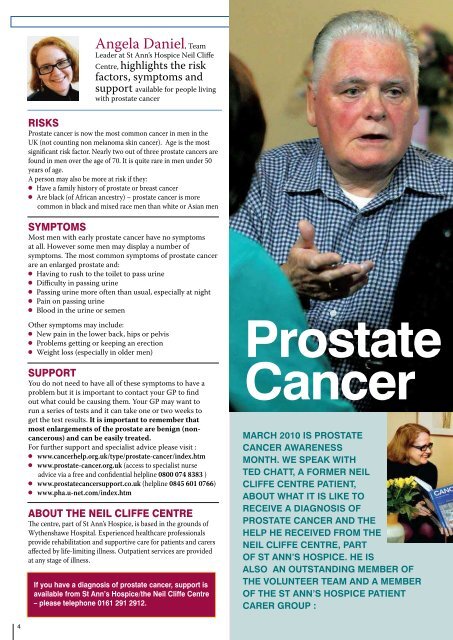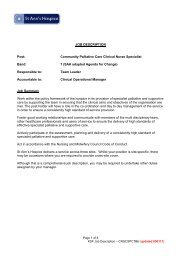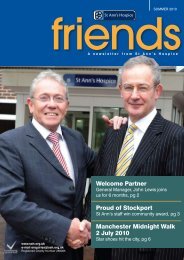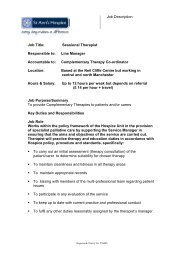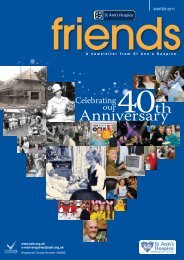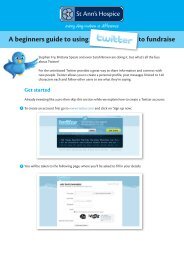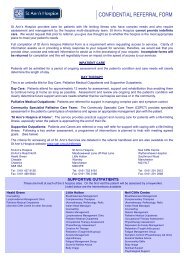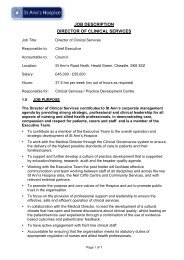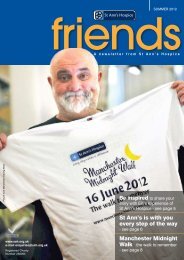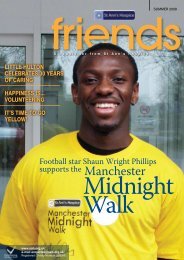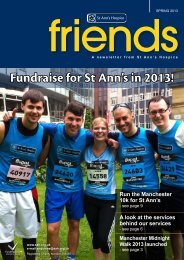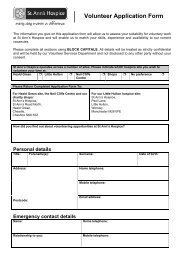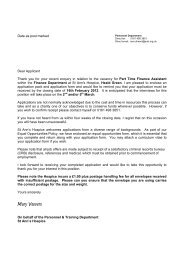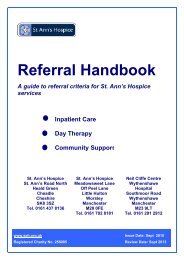Download as Adobe PDF file (1.78 MB) - St Ann's Hospice
Download as Adobe PDF file (1.78 MB) - St Ann's Hospice
Download as Adobe PDF file (1.78 MB) - St Ann's Hospice
Create successful ePaper yourself
Turn your PDF publications into a flip-book with our unique Google optimized e-Paper software.
FEATUREFEATUREAngela Daniel, TeamLeader at <strong>St</strong> Ann’s <strong>Hospice</strong> Neil CliffeCentre, highlights the riskfactors, symptoms andsupport available for people livingwith prostate cancerRISKSProstate cancer is now the most common cancer in men in theUK (not counting non melanoma skin cancer). Age is the mostsignificant risk factor. Nearly two out of three prostate cancers arefound in men over the age of 70. It is quite rare in men under 50years of age.A person may also be more at risk if they:● Have a family history of prostate or bre<strong>as</strong>t cancer● Are black (of African ancestry) – prostate cancer is morecommon in black and mixed race men than white or Asian menSYMPTOMSMost men with early prostate cancer have no symptomsat all. However some men may display a number ofsymptoms. The most common symptoms of prostate cancerare an enlarged prostate and:● Having to rush to the toilet to p<strong>as</strong>s urine● Difficulty in p<strong>as</strong>sing urine● P<strong>as</strong>sing urine more often than usual, especially at night● Pain on p<strong>as</strong>sing urine● Blood in the urine or semenOther symptoms may include:● New pain in the lower back, hips or pelvis● Problems getting or keeping an erection● Weight loss (especially in older men)SUPPORTYou do not need to have all of these symptoms to have aproblem but it is important to contact your GP to findout what could be causing them. Your GP may want torun a series of tests and it can take one or two weeks toget the test results. It is important to remember thatmost enlargements of the prostate are benign (noncancerous)and can be e<strong>as</strong>ily treated.For further support and specialist advice ple<strong>as</strong>e visit :● www.cancerhelp.org.uk/type/prostate-cancer/index.htm● www.prostate-cancer.org.uk (access to specialist nurseadvice via a free and confidential helpline 0800 074 8383 )● www.prostatecancersupport.co.uk (helpline 0845 601 0766)● www.pha.u-net.com/index.htmABOUT THE NEIL CLIFFE CENTREThe centre, part of <strong>St</strong> Ann’s <strong>Hospice</strong>, is b<strong>as</strong>ed in the grounds ofWythenshawe Hospital. Experienced healthcare professionalsprovide rehabilitation and supportive care for patients and carersaffected by life-limiting illness. Outpatient services are providedat any stage of illness.If you have a diagnosis of prostate cancer, support isavailable from <strong>St</strong> Ann’s <strong>Hospice</strong>/the Neil Cliffe Centre– ple<strong>as</strong>e telephone 0161 291 2912.Members of our Patient/Carer group share theirthoughtsProstateCancerMARCH 2010 IS PROSTATECANCER AWARENESSMONTH. WE SPEAK WITHTED CHATT, A FORMER NEILCLIFFE CENTRE PATIENT,ABOUT WHAT IT IS LIKE TORECEIVE A DIAGNOSIS OFPROSTATE CANCER AND THEHELP HE RECEIVED FROM THENEIL CLIFFE CENTRE, PARTOF ST ANN’S HOSPICE. HE ISALSO AN OUTSTANDING MEMBER OFTHE VOLUNTEER TEAM AND A MEMBEROF THE ST ANN’S HOSPICE PATIENTCARER GROUP :“When I w<strong>as</strong> first diagnosed I w<strong>as</strong>told that the prognosis w<strong>as</strong> not goodbecause the cancer had spread,” saysTed Chatt, a former patient and nowself-styled ‘crusader’ for the Neil CliffeCentre.Ted says his diagnosis at the relativelyyoung age of 63 came <strong>as</strong> somethingof a shock since he had virtually nosymptoms of prostate problems and hadinitially been referred to see a urologistat his local hospital after routine bloodtests suggested he might have kidneyproblems.“The consultant said my kidneys werefine then just came out and told me Ihad prostate cancer,” says Ted. “It w<strong>as</strong>a real shock but then I had previouslythought there might be somethingwrong <strong>as</strong> I had been having some painin my back and my groin which mydoctor had put down to me being a keengolfer.”Surgery w<strong>as</strong> suggested and Ted w<strong>as</strong>referred to the Christie Hospital buthe soon found out that this w<strong>as</strong>n’t anoption. The cancer had spread to hisspine meaning radiotherapy w<strong>as</strong> alsonot possible. Instead Ted w<strong>as</strong> givenanti-hormone drugs which, he says,have ‘done their job by holding thecancer back’.‘The first minute we walkedthrough the door Norma and Iknew this place w<strong>as</strong> going to make areal difference’Ted and Norma talk to Team Leader Angela DanielWhile Ted h<strong>as</strong> received fant<strong>as</strong>ticsupport from The Christie he creditsthe Neil Cliffe Centre with turning hislife around.“About 18 months into my treatment Iw<strong>as</strong> feeling a bit low. I w<strong>as</strong>n’t in denialbut I w<strong>as</strong> particularly worried abouthow my wife Norma would cope <strong>as</strong>time went on,” he explains. “I heardfrom The Christie about the Neil CliffeCentre and from the very first minutewe walked through the door Normaand I knew this place w<strong>as</strong> going tomake a real difference to our lives.”Ted continues: “Both of us were madeto feel so welcome. Everyone had timefor us. They sat us down, made us acoffee and listened. I can’t tell you whatthey’ve done. I’d go <strong>as</strong> far <strong>as</strong> to say theNeil Cliffe Centre h<strong>as</strong> made me who Iam today. It’s given me my focus anda really positive outlook. I can’t thankeveryone who works there enough.”As well <strong>as</strong> benefiting from a varietyof treatments including fatiguemanagement, m<strong>as</strong>sage and physiotherapy,Ted says it is the emotional supportgiven by staff and fellow patients whichmakes the biggest difference. “I havemade such incredible friends,” heexplains. “Meeting people and beingable to open up to them in a way thatyou can’t even do with your own familyis amazing. Norma h<strong>as</strong> had so muchsupport <strong>as</strong> well.”Ted is now a member of the PatientCarer Group at <strong>St</strong> Ann’s <strong>Hospice</strong> whichmeets to find out service users’ viewson our services. He isalso a volunteer. “I can’tdo enough to extol thevirtues of the Neil CliffeCentre,” he says.Ted who h<strong>as</strong> twochildren and twograndchildren enjoyslife to the full. Havingvisited Italy many timesin his professional life, he h<strong>as</strong> a loveaffair with the country and its peopleand he and Norma enjoyed three visitsduring 2009. He h<strong>as</strong> also done someamb<strong>as</strong>sadorial work with Neil Cliffehimself.“Things are looking good,” says Ted.“I still suffer from fatigue and hotsweats which are more a result of thetreatment than the illness but, overtime, I have learnt to m<strong>as</strong>ter these.”Ted is keen to share his experience ofbeing diagnosed with prostate cancerand tell people more about the supportthat the Neil Cliffe Centre offers people.He h<strong>as</strong> offered to talk to communityand other groups <strong>as</strong> well <strong>as</strong> individuals.If you would like to arrange a talk/visitple<strong>as</strong>e call 0161 498 3635 or emailcwilliams@sah.org.uk in the firstinstance.Celebrity m<strong>as</strong>seuse, Bongo Man, treats DayTherapy practitioner Cath Baena-Parr<strong>as</strong>ComplementaryTherapyComplementary therapiesare used extensively acrossall three hospice sites tohelp and support patients.Helen Murphy, ComplementaryTherapy Co-ordinator at <strong>St</strong> Ann’s<strong>Hospice</strong>, explained that the therapyteam is trained in a range ofspecialist techniques to <strong>as</strong>sist with avariety of concerns such <strong>as</strong> fatigue,insomnia and anxiety.“Everyone enjoys a relaxing m<strong>as</strong>sagebut the complementary therapies weuse at <strong>St</strong> Ann’s <strong>Hospice</strong> are allspecialist clinical therapies developedto best <strong>as</strong>sist our patients,” explainsHelen.Helen and some of the complementarytherapy team recently met celebritym<strong>as</strong>seuse to the stars, Bongo Man,who works at the exclusive SandyLane resort in Barbados and h<strong>as</strong>m<strong>as</strong>saged, among others, SimonCowell and Cindy Crawford.Bongo Man w<strong>as</strong> in Manchester <strong>as</strong> aguest of entrepreneur Tony Fordwho flew him over to help raisemoney for <strong>St</strong> Ann’s <strong>Hospice</strong> andother local charities.“He w<strong>as</strong> a big hit with everyone atthe hospice and w<strong>as</strong> f<strong>as</strong>cinated tolearn about the range of clinicalm<strong>as</strong>sages our team h<strong>as</strong> developed,”said Helen.4 5


